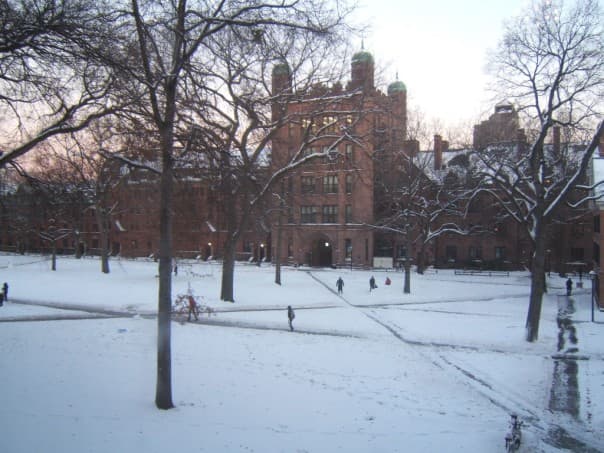Federal Appeals Court Says Ex-Yale Student, Expelled Over Rape Accusation, Can Sue His Accuser for Defamation
The case could upend disciplinary procedures at colleges nationwide, ensuring that accused students are granted due process rights like the ability to cross-examine their accusers.

A former Yale student who has become a poster boy for unfair college sexual misconduct hearings has scored a big court win that could have lasting effects on how colleges handle campus sexual assault cases — and could mean a big payout from his rape accuser and Yale.
The Second Circuit of the United States Court of Appeals on Wednesday ruled that Saifullah Khan’s $110 million defamation suit against Yale and a classmate who accused him of rape was wrongfully dismissed. The circuit court sent the case back to the district court to be decided on the merits.
More significantly, the judges ruled that Jane Doe can be sued for the rape claim she made against Mr. Khan at Yale’s 2018 sexual misconduct hearing, both in terms of defamation and for causing his expulsion from Yale.
This is because, the judges say, the Yale hearing denied Mr. Khan due process protections like the right to face and cross-examine his accuser, and because he “sufficiently” alleges her rape accusations were false.
Yale did not join the motion to dismiss the case and so was not included in the appellate ruling. The university is, though, a chief defendant in the $110 million civil suit that is now sent back to district court for trial. Mr. Khan is suing Yale for violating his due process rights, breach of contract, emotional distress, and breach of privacy.
The Second Circuit’s precedent-setting ruling could sound the death knell for qualified immunity for accusers in college Title IX sexual assault cases and open the door to big payouts from universities that fail to protect the rights of students who say they were falsely accused of rape or sexual assault.
Title IX is part of a civil rights law passed in 1972. The measure prohibits sex-based discrimination in schools that receive federal funding, and governs athletics and how sexual misconduct complaints are handled.
The major question now is whether Yale will try to settle the suit rather than face an extensive discovery process, in which attorneys from both sides can interview the parties and gain access to incriminating evidence like internal emails, contemporaneous notes, and records.
Yale has made no public statements about this case outside of its court filings, and declined to comment to the Sun.
“Anybody in a Title IX lawsuit should use this as a guiding north star of sorts,” Mr. Khan tells the Sun. “You hit them with large jury awards or settlements. Those have the very real practical effect of removing false accusations.”
“I believe this is the pathway. This is the way to hit back,” Mr. Khan says. “I don’t see Khan v. Yale being overturned for decades. This is history. It’s been made.”
Mr. Khan was a neuroscience major and full scholarship student at Yale in 2015, when a fellow Yalie accused him of rape after a Halloween party. Mr. Khan says the sex was consensual. He was acquitted of all charges in a criminal court in 2018.
The case didn’t end there, though. In 2018, Yale held its own Title IX disciplinary hearing, in which it found Mr. Khan liable for sexual assault and expelled him. At the hearing, neither Mr. Khan nor his attorney were allowed to cross-examine his accuser, call witnesses, or even sit in the same room with Jane Doe. Ms. Doe was also not required to testify under oath, and a transcript of the hearing was not made available for appeal.
After being expelled, Mr. Khan, a native of Afghanistan, faced deportation and had no money or place to live. He responded by filing the defamation suit. When the case was dismissed from district court, he appealed. He has unnamed financial backers funding his lawsuit.
In a brief, Mr. Khan alleges that not only were Jane Doe’s accusations false, but that the Yale campus was swept up in an “overheated ‘Me Too’ sensibility that, for a time, overcame more sober application of due process and fundamental fairness customarily afforded both accusers and accused.”
More than 77,000 people signed a petition in 2018 to remove Mr. Khan from campus. Yale, he contends, had an institutional interest in getting rid of him to satisfy social justice activists on campus and the Department of Education’s Office of Civil Rights, which had investigated Yale for allegedly sweeping rape allegations under the rug.
Mr. Khan’s status as a foreign scholarship student, who had gotten into Yale while living in a refugee camp and having no resources, made him an easier target, he says.
In June, the Connecticut supreme court weighed in on the case at the Second Circuit’s request. The state high court found that Yale’s Title IX disciplinary proceeding lacked so many basic due process protections that it could not even be considered “quasi-judicial,” removing Jane Doe’s right to absolute immunity from her statements, if found to be false.
“There is no benefit to society or the administration of fair and impartial disciplinary hearings in granting absolute immunity to those who make intentionally false and malicious accusations of sexual assault,” the court wrote.
“Those accused of sexual assault in the higher education context often face life altering and stigmatizing consequences,” the court wrote. “In the face of these consequences, we must acknowledge that the accused’s right to fundamental fairness is no less important than the right of the accuser or the larger community to achieve justice.”
The Second Circuit’s opinion last week by a unanimous panel of three judges — Chief Judge Debra Ann Livingston and Judges Reena Raggi and Amalya Kearse — affirmed the Connecticut supreme court.
The panel also ruled that Jane Doe does not have qualified immunity in this case. “We conclude that the allegations in Khan’s complaint — when viewed in the light most favorable to him, as they must at this stage of the litigation — suffice to plead the malice required to defeat qualified immunity at this stage of the proceedings,” the opinion states.
This ruling is significant because it opens the door to other students who contend they were falsely accused and unfairly treated in college disciplinary hearings to file defamation and breach of contract suits against their colleges and Jane Does.
Sexual assault survivor advocates warn this will make victims less likely to come forward. Fifteen sexual assault advocacy organizations filed a brief earlier in this case in support of Jane Doe, writing, “Without absolute immunity for statements made during such processes, long-established laws aimed at preventing and responding to discrimination in education will be undermined.”
In its court response to Mr. Khan’s lawsuit, Yale denied it violated Mr. Khan’s due process rights and any other claims. While the Connecticut supreme court and the Second Circuit rulings are not binding to Yale, Mr. Khan’s attorney, Norman Pattis, tells the Sun they offer “a roadmap to proving that Yale’s Title IX process is no real legal process at all. It’s little more than a kangaroo court.”
Mr. Pattis adds, “We’re going back to the trial court to begin discovery in earnest. And I’m very optimistic.”
“The goal here is to make Title IX hearings vestigial, an archaic thing of the past, where colleges stop having them because students won’t go to them,” Mr. Khan says. “It’s very important that students go to the proper authorities. They shouldn’t be hiding behind the veil of anonymity and college administrators where they hurt innocent people without repercussions.”
The ruling also comes as the Biden administration prepares to release its new Title IX regulations, which — as outlined in the administration’s proposed rules — will strip accused students of many of the due process protections that the Trump administration required in 2020. If Mr. Khan wins a big payout from Yale, this could make colleges hesitant to eliminate live hearings, cross-examination, and other legal protections instituted in 2020. The Sixth Circuit has also ruled that college Title IX sexual misconduct hearings must have cross-examination.
“Khan’s case illustrates the courts are not going to be as cavalier with the rights of accused students as the Biden administration is,” the legislative and policy director at the Foundation for Individual Rights and Expression, Joe Cohn, told the Sun in August. “We need to do everything we can to make sure that no allegation is swept under the rug, but also everything we can to make sure they’re all decided fairly.”
One indication that Yale may try to settle this defamation case instead of enduring a long and potentially embarrassing discovery process is evidence uncovered by prosecutors shortly before Mr. Khan’s original criminal sexual assault trial was set to begin.
In 2017, just before the October trial start date, the Yale Police Department submitted a trove of notes from administrators and investigators uncovering what Mr. Khan’s court filings say was anti-Muslim bias against him. “Yale administrators had written notes to each other saying, ‘Oh, he’s from Afghanistan. Violence is accepted. He must have done it,’” Mr. Khan says.
The judge declared a mistrial and postponed the criminal trial until 2018, at which time Mr. Khan was acquitted of all charges. This is just one example of the type of evidence that Yale may want to avoid making public in a drawn-out discovery process.
Mr. Khan’s attorney says a settlement, though, is no guarantee. “If he wanted to take a million dollars today, I could probably get him that fairly soon,” Mr. Pattis says. “If he wants $10, $20, $30, $110 million — we gotta fight for that.”
Mr. Khan says his goal is to get colleges out of the sexual assault adjudication business altogether. “I am going to break the entire kangaroo ‘courts’ system,” Mr. Khan posted to X, after Elon Musk weighed in on his case in September, posting, “Good for him and shame on those who condemned an innocent man.”
Jane Doe’s attorney did not respond to the Sun’s request for comment, and she is not speaking to the press. After several years of silence, though, Mr. Khan is making his fight public. Although he says he will settle with Yale “for the right price,” he is not finished fighting what he says in an unjust Title IX system.
“Look, I was born in a refugee camp. I didn’t choose what happens to me, I can only choose how I respond to the world,” Mr. Khan says. He has not finished his degree since getting expelled from Yale. Instead, this fight has become like a full-time job.
“I’m going to make sure that it doesn’t happen to others,” he says.

